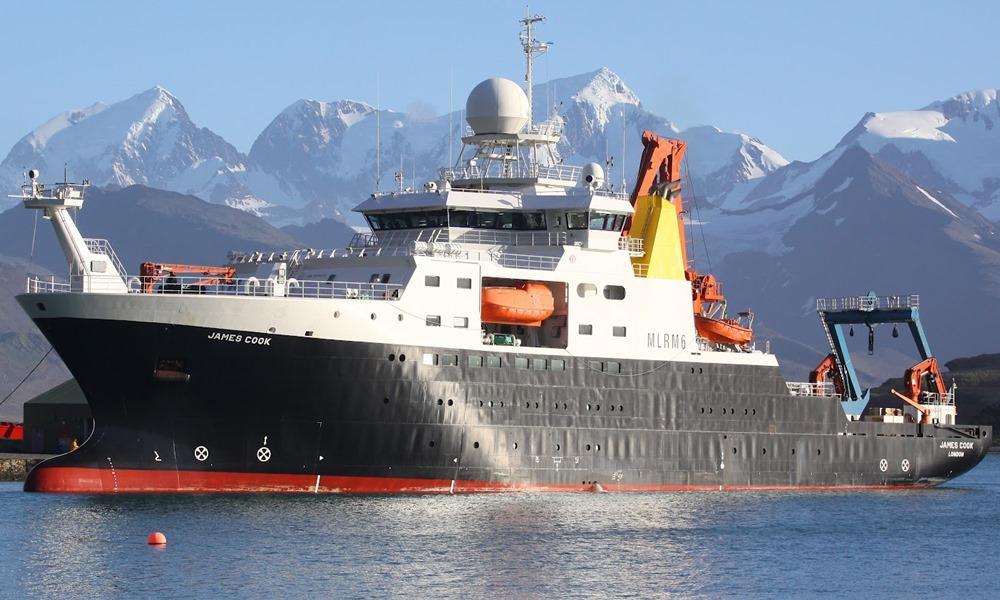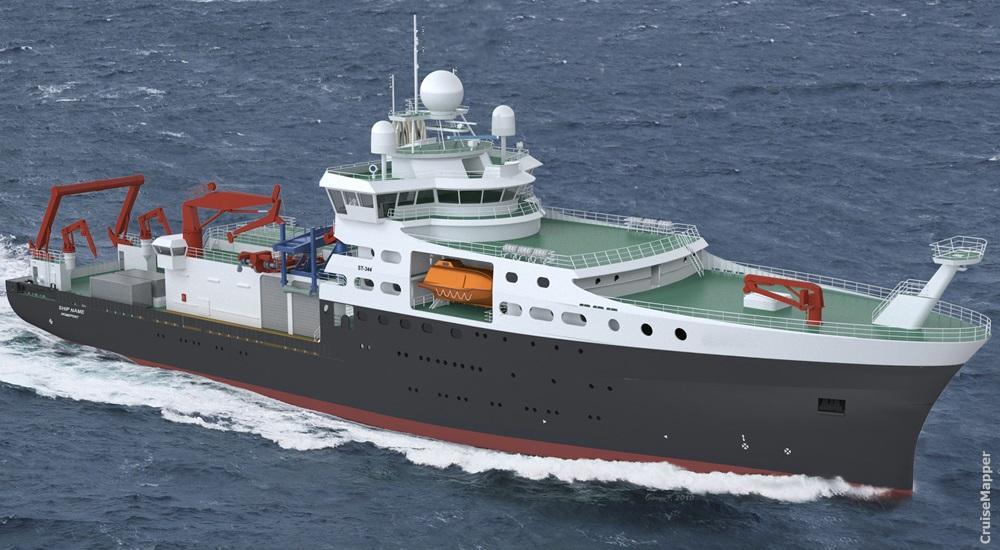RRS James Cook
RRS James Cook current position
The current location of RRS James Cook is in Caribbean Sea cruising en route to Grand Turk Island. The AIS position was last reported 14 minutes ago.
Current PositionSpecifications of RRS James Cook
| Year of build | 2006 / Age: 20 |
| Flag state | United Kingdom |
| Builder | Flekkefjord Slipp & Maskinfabrikk (Flekkefjord, Norway) |
| Class | ice-strengthened research ship |
| Building cost | GBP 36 million (USD 50 million) |
| Speed | 16 kn / 30 km/h / 18 mph |
| Length (LOA) | 90 m / 295 ft |
| Beam (width) | 19 m / 62 ft |
| Gross Tonnage | 5401 gt |
| Passengers | 32 |
| Crew | 22 |
| Decks | 7 |
| Decks with cabins | 2 |
| Christened by | HRH Anne (The Princess Royal) |
| Owner | UK government (NERC) |
RRS James Cook Review
Review of RRS James Cook
The 2007-built RRS James Cook is an ice-strengthened research vessel serving as an oceanographic survey ship, homeported in Tilbury-London (England UK). Her sistership (of similar design) is RRS Discovery (launched in 2013). RRS stands for "Royal Research Ship."
Royal Research Ships are UK-flagged merchant navy vessels conducting scientific research for the British Government (HMG). Organizations authorized to operate RRS vessels include NERC ("Natural Environment Research Council"), BAS ("British Antarctic Survey"), and NOC ("National Oceanography Centre"). A warrant from the British monarch is required for a vessel to be designated as RRS. The UK’s current fleet of Royal Research Ships includes RRS James Cook (2007), RRS Discovery (2013, sistership), and RRS Sir David Attenborough (2021).

This British research vessel is operated by the UK government agency NERC ("Natural Environment Research Council"). The vessel is named after Captain James Cook (1728–1779), a British Royal Navy captain, explorer, and cartographer.
RRS James Cook vessel details
This research ship features an ice-strengthened double hull and containerized laboratories that can be outfitted according to the scientific objectives of each expedition. She is equipped with an advanced hydroacoustic system comprising two echosounders and one keel-mounted hydrophone, and can operate one ISIS ROV (remotely operated vehicle) with a maximum working load of 4.5 tons.

- The vessel is also fitted with a dynamic positioning system, CCTV monitoring equipment, and echosounder units by the Norwegian company Kongsberg Maritime (multibeam deepwater model EM122, multibeam medium-water model EM710, single-beam model EA600), a sub-bottom profiler (Kongsberg SBP120), and a scientific echosounder (Simrad EK60). Deck equipment includes an aft articulated cargo crane (17 m, Ferri Serie A6 100170, single pull 10 tons, double pull 20 tons), a hydraulic winch (10-ton pull, wire length 500 m / 1,640 ft), and a forward knuckle crane (Ferri Serie A0 020120, 12 m, 2 tons). A 10-ton longitudinal transfer gantry crane is used to lift heavy equipment and TEU containers from the aft cargo deck into the hangar. A separate 5-ton gantry crane is dedicated to ROV deployment.
- The ship is powered by four "Wartsila 9L20" marine diesel engines (combined output 7,080 kW).
- Propulsion is diesel-electric, provided by two Teco Westinghouse generator sets (combined output 5,000 kW). The vessel is fitted with five thrusters (each with five-bladed fixed-pitch propellers): one retractable bow thruster (1,200 kW), one 360-degree azimuth thruster (1,350 kW), and two fixed stern thrusters (1,600 kW and 800 kW).
- Displacement: 5,800 tons
- Deadweight: 2,463 tons
- Maximum draft: 5.7 m (19 ft) fully loaded
- Ice class: 1C (ice-strengthened bow)
- Endurance: 50 days
- Capacity: 54 personnel (scientists and crew)
- The ship has no helipad and cannot accommodate helicopters.
Note: In cases of poor AIS coverage, tracking the vessel’s current position may not be possible. CruiseMapper’s list of all icebreakers and ice-strengthened research ships can be found in the "itinerary" section of our Icebreakers hub, where fleets by country are also listed.
Other UK cruise ships
RRS James Cook Wiki
RRS James Cook’s superstructure was built by the Norwegian shipbuilder "Flekkefjord Slipp and Maskinfabrikk AS." The hull was constructed at the Gdansk Shipyard (in Gdansk Poland).
The vessel’s design was developed by the Alesund Norway-based company Skipsteknisk (also the designer of RRS Discovery).
The ship was christened in February 2007 by her godmother, HRH Anne Elizabeth Alice Louise (Princess Royal).
This state-of-the-art scientific research vessel operates worldwide scientific expeditions. She specializes in research related to marine ecosystems and seismic surveys (underwater earthquakes). In March 2007, while operating in the Caribbean Sea, RRS James Cook discovered some of the world’s deepest undersea volcanic vents. Another significant discovery was made in September 2015. While studying the seabed of Whittard Canyon (Bay of Biscay), she recorded the first sighting of a blue whale (a baleen whale) in British waters since these northeast Atlantic marine mammals were nearly hunted to extinction.
